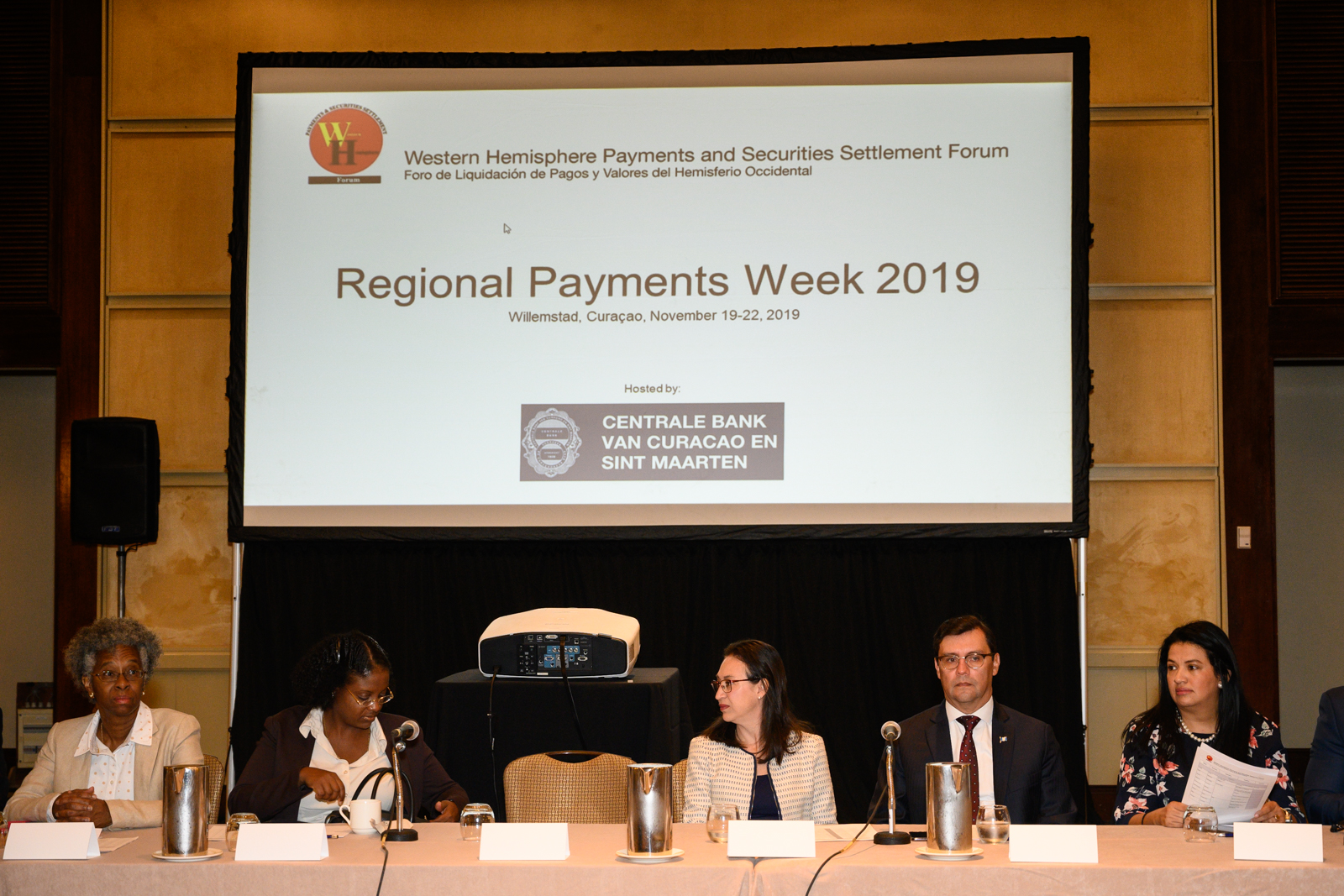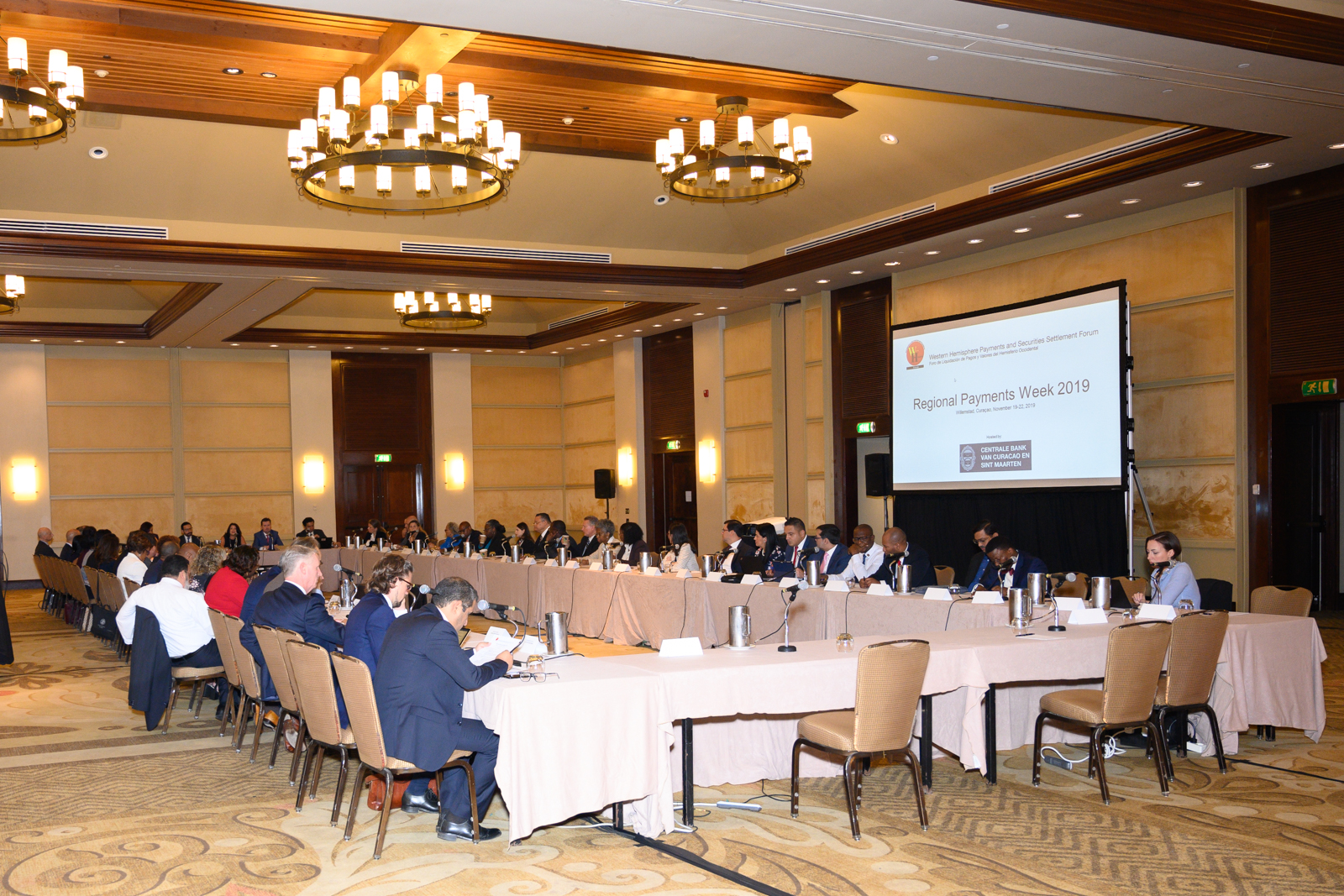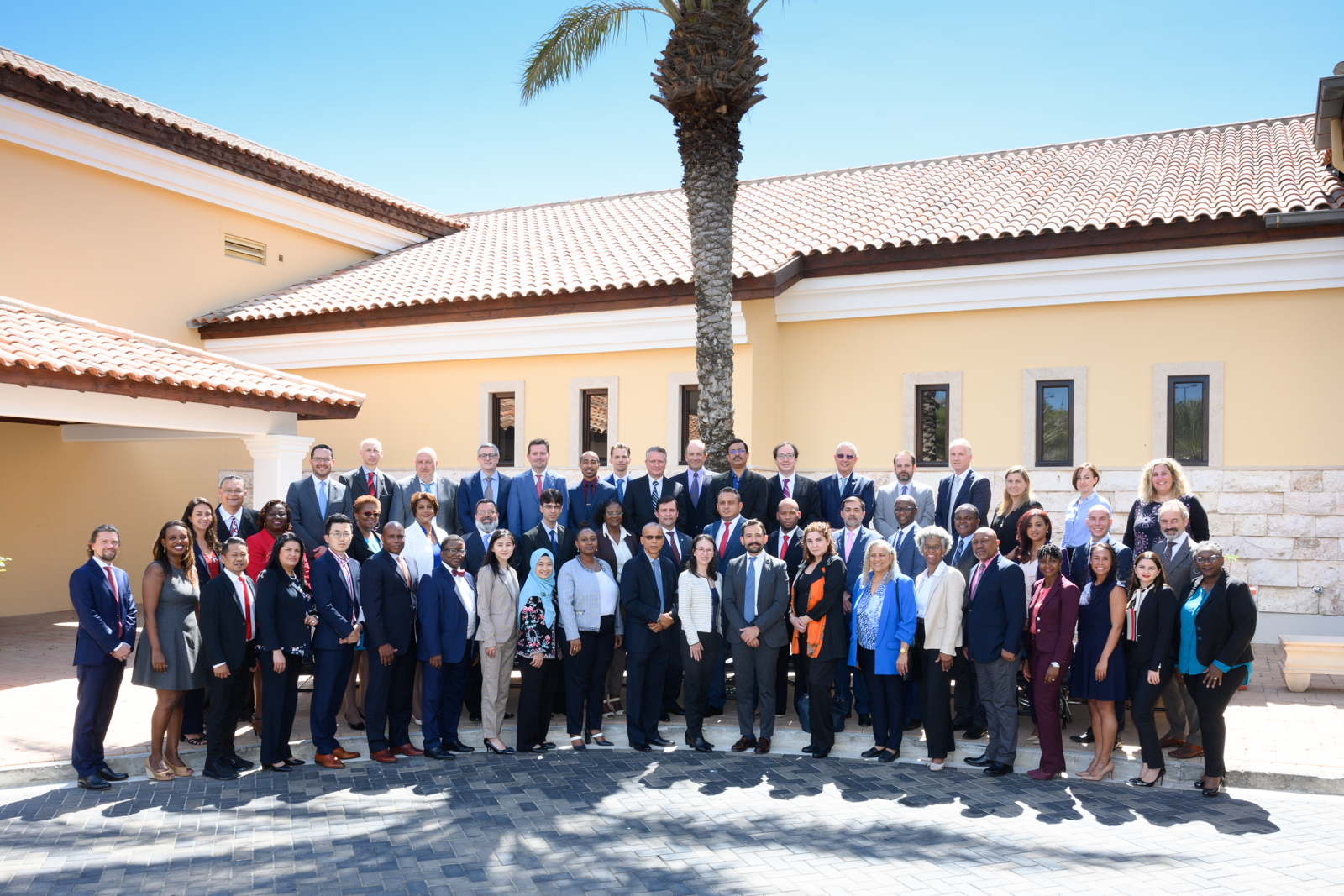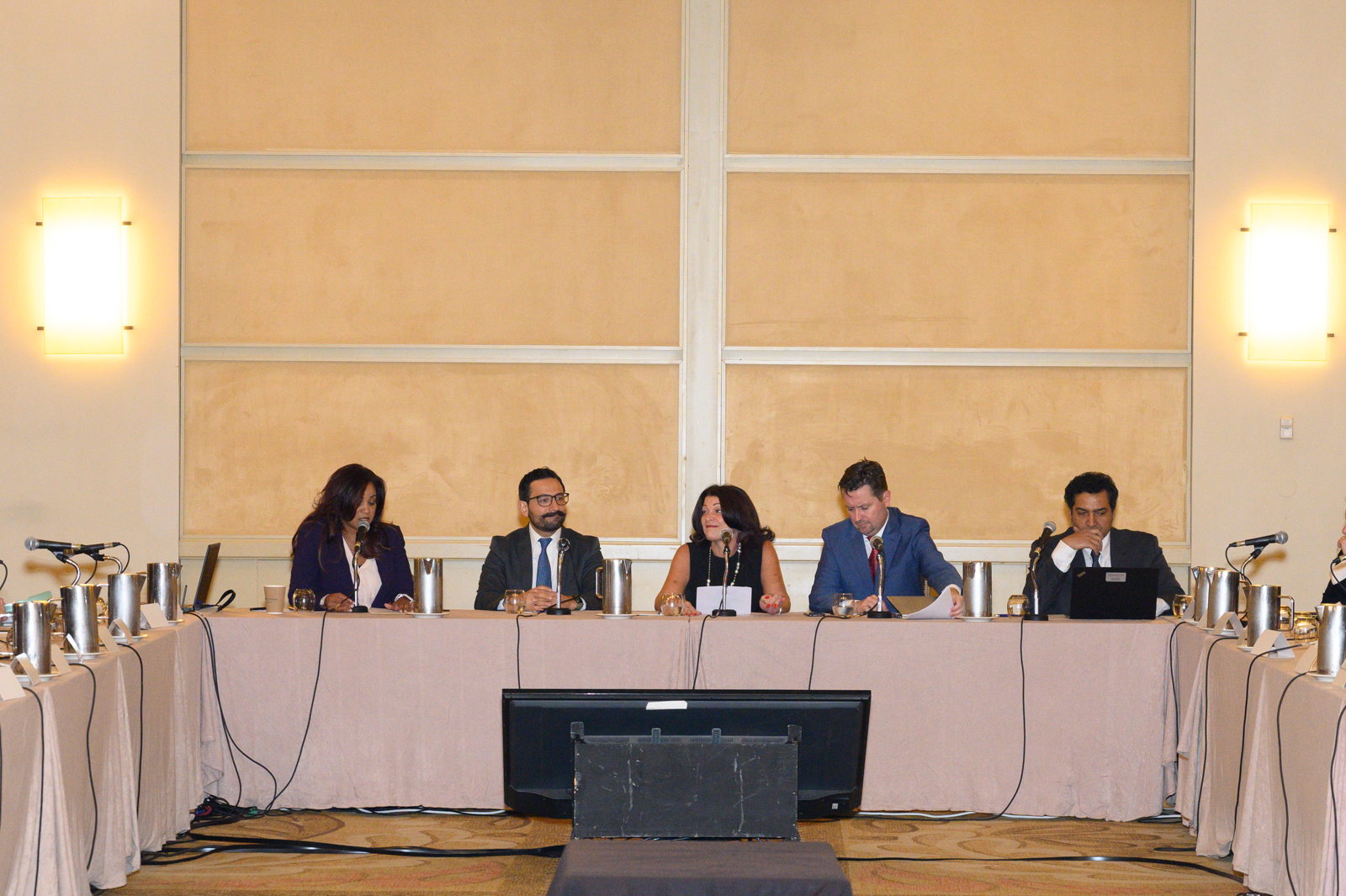Regional Payments Week 2019
Willemstad, Curaçao, November 19–22, 2019
The Center for Latin American Monetary Studies (CEMLA), the World Bank Group (WBG) and the Committee on Payments and Market Infrastructure (CPMI) organized the Regional Payments Week 2019 in Willemstad, Curacao on November 19-22, 2019. The Meeting was attended by over 60 participants representing Latin American and Caribbean central banks, international organizations and non-regional central banks from Africa, Asia and Europe.
The objective of the Meeting was to bring together the experts and heads of department for payments and financial market infrastructures, to discuss key policy and practical developments, including Global Stablecoins (GSC) and Central Bank Digital Currencies (CBDC), regulation and oversight of payment innovations, and developments in Real Time Gross Settlement Systems (RTGS), among other topics.
International agenda for payments and financial market infrastructures
The Head of CPMI Secretariat, Mr. Morten Bech, presented the key issues that are reshaping the payments and market infrastructures landscape, namely: addressing the shortcomings of the current cross-border payments arrangements, the issuance of CBDC and the emergence of GSC, and the initiatives to modernize RTGS systems at the international scale.
Along the presentation, it was discussed that among the developments enabled by new technologies, immediate risks may be harnessing the safety and reliance at financial market infrastructures. Cyber and fraud risk, as well as FX settlement risk were mentioned as top priorities for the international community. To address new risks and existing gaps, it was underlined the importance for central banks to leverage international standards and guidance, as well as continue sharing emerging practices across the region and abroad.
To conclude this presentation, central banks were briefed on international trends shown by the Red Book Statistics and the fintech phenomenon that has changed economics of payments by introducing greater competition.
Session 1. Opportunities around stablecoins and central bank digital currencies (CBDC) in Emerging Economies
This session was formed by a panel of presenters from the Central Bank of Bahamas, Curacao and Saint Marten, Eastern Caribbean and Uruguay.
First, the Chair of the session presented an overview of how CBDC and GSC may be changing the game with digital money solutions. Existing inefficiencies on a domestic and cross-border scales, have helped to see raising CBDC and GSC projects. The former to address inclusion and competition aspects at national scale, while the latter are a response to the lack of rails for making payments abroad, for instance, remittances from migrants. As part of the introduction of the session, it was highlighted that bigtech firms could be playing a key role in the near future by providing powerful global payment platforms. A key message on this topic is that central authorities must consider the most appropriate regulatory treatment for these developments.
The panel helped to deep dive in the design features, the public policy considerations of general-purpose CBDC, by presenting the pilot project and analysis in regional central banks.
From the discussion, it can be concluded that payments are seen as a public good by central banks and in the absence of developments led by the private sector, a CBDC system might be meaningful to address access and competition shortcomings. However, it was also underlined that operational and legal novelties are not yet understood. Experimentation and further analysis will be shading light in some policy questions that central banks still face, such as privacy and data management.
Workshop on Payment Aspects for Financial Inclusion (PAFI)
This workshop was designed to discuss recent experience in central banks to adopt the Guiding Principles (GP) on Payment Aspects for Financial Inclusion (PAFI) and to learn from the CPMI-WB PAFI Task Force developments and guidance, in specific fintech issues with connection to payments.
From the experience shown in Albania, Guatemala and Paraguay, the following were identified as the most relevant pillars to advance financial inclusion: 1) a modern and inclusive retail payments market, 2) safe and efficient payment infrastructures, and 3) a wide range of instruments and services that meet the users’ needs. In particular, central banks are working toward the improvement of retail payments instruments to provide unbanked and underbanked citizens with more payment product choices and points of sales that are necessary for their day-to-day transactions in a convenient and cost-effective manner. These three central banks, which have started to implement the PAFI Guiding Principles, concluded their participation by mentioning that it will be important to promote the interoperability between the payments’ solution offered by incumbents and new entrants.
The workshop session continued with a brief report of the PAFI Task Force. The purpose of the report was to present additional work led by this international group to assist central banks in the implementation of the Guiding Principles. The following areas of work were presented: 1) a guidance toolkit to apply the PAFI GP; 2) a measurement framework and other tools to assist countries in tracking their progress on improving access to and usage of transaction accounts; and 3) specific guidance on recent fintech developments that have relevant implications for PAFI’s underlying objectives.
To conclude the workshop, the European Central Bank (ECB), and the central banks of Jamaica and Dominican Republic, discussed how key fintech developments are supporting financial inclusion efforts as part of their payments’ agenda. At the outset, it was noted the potential to transform the provision of financial services, spurring the development of new business models, applications, processes, and products, given new technologies applied to financial and payment products. For instance, fintech could be used to foster financial while using the payment service itself, all at once.
Whit the above presentations, it was concluded that payments regulation is an aspect that will require further work to ensure that new products and business models are reliable for the users’ integrity. Finally, some of measures of success that these central banks have found as relevant to support financial inclusion via fintech payments are: incumbents-new entrants’ collaboration; sandbox and related regulatory tools; a consumer protection framework; and an enhanced interoperability framework for the industry to leverage new technologies accordingly.
Session 2. Payment and market infrastructures developments
This session was led by Reserve Bank of India, the Southern African Development Community / South African Reserve Bank, the European Central Bank, and the central banks of Aruba, Brazil and Curacao and Sint Maarten.
The panelists presented their current agenda in payments and market infrastructures, ranging from RTGS modernization, updates in the regulation and oversight framework, among other important developments.
Some common drivers that panelists mentioned along the session were:
- Supporting Financial inclusion efforts,
- Promoting less cash in the economy,
- Meeting the needs on faster payments,
- Addressing Interoperability gaps, and
- Integrating government payments.
With this vision, central banks discussed how to enable such a landscape. While the approach taken by each central bank may differ, it can be underlined the following strategies: enhancing customer experience, empowering payment system providers and operators, developing the required infrastructure, establishing a forward-looking regulation, and performing a risk-based oversight framework. In many of the country experiences presented in this session, fast payments scheme enabled by the RTGS (the central banks’ infrastructure), was identified as a common factor.
Central banks explained that (retail) fast payments via the RTGS have the potential to generate benefits to end users, industry participants and society, and at the same time create the conditions for a proper implementation and adoption, having the participation of the most relevant stakeholders. Moreover, central banks all agreed that the implementation of fast payments might reflect the usage of new technologies to materialize market developments, such as the broaden use of mobile technologies to fulfill the users’ needs of speed and convenience. Likewise, with the mission in mind, central banks would be fostering an overarching vision of upgrading and modernizing a jurisdiction’s financial market infrastructure.
Concerning the specific actions related to the implementation of a fast payments scheme, central banks agreed that the following will be aspects to bear in consideration: scalable, reliable and low-cost operation RTGS adds, operational ability to handle transactions of new participants (payment institutions), and adequate accessibility rules to ensure all payment system participants and operators would fit in the scheme.
To conclude, the central banks identified some important questions to tackle when working toward the modernization of the national financial market infrastructure. These questions are related to: 1) how to ensure the coordination of the overall effort of the different stakeholders, 2) how to provide the right incentives to the industry to adopt a long-term strategic approach, and 3) how to find the right balance of public intervention.
Session 3. Operationalizing the CPMI strategy for wholesale payments security
This session was chaired by the CPMI Secretariat and the panel of presentations included the central banks of Dominican Republic and the Netherlands, and a featured presentation of CEMLA on regional developments.
The chair started the session by introducing the overall framework on how to operationalize the CPMI wholesale payments endpoint security strategy (WPS). The presentation covered key intended outcomes of the strategy, emerging practices, the operationalization toolkit, and resources for regional central banks. One of the key messages of the introduction of the session, was that a successful operationalisation of the strategy depends on operators, participants and other relevant private sector and public sector stakeholders in each jurisdiction engaging actively in and taking ownership of developing and carrying out an appropriate action plan for their respective jurisdictions.
Following the CPMI presentation, the panelists of the session presented how their central banks are dealing with challenges faced by industry and the central bank itself to operationalize the CPMI WPS strategy.
In general, central banks pointed out some particular concerns looking ahead. To name a few, the monitoring template of the strategy does not allow to measure how specific actions will help to reach the expected outcome; reported status by 2021 is a proxy based on expectations; LAC central banks reported complexity to interpret the Strategy examples and actions; as expected, implementation sometimes is based on urgency or risk perceived by each authority; it is not clear how to reach out the PSP and PSO to ensure adherence; and, that new entrants and possible changes in FMI access arrangements will suggest that additional guidelines will be required.
As a case in point, one of the central banks presented a detailed strategy on cyber testing that could help to operationalize specific aspects of the CPMI WPS strategy, in a living and more accurate fashion. Along this presentation, it was shown how testing exercises are helpful tools to identify risk vectors as well as to develop response actions at central banks.
To conclude this session, it was mentioned that adapting the regulation will be also required in some circumstances to establish clear guidelines for regulators, payment system participants and operators, and all kind of endpoints to ensure integrity, availability and confidentiality of the information and the optimal functioning of their ICT Infrastructure. Furthermore, regulated entities are expected to pay more attention to cyber threats, thus enabling greater monitoring and planning from the incident response teams.
Session 4. Fintech initiatives and developments
This session was formed by presentations of BIS, World Bank and Fintech CARICOM Working Group, with focus on international and regional fintech initiatives related to payments, and that will have direct implications for central banks and other relevant authorities.
The topics in focus were: ageing and digital financial inclusion, digital identity, and a regulatory agenda against cash.
Concerning ageing and digital financial inclusion, the participants were briefed on the global concerns raised by the G20. In the particular case of payments, the emergence of new products and business models requires that central banks safeguard the financial system stability and, if possible, encourage such developments to become a gateway for formal savings schema and support lifetime financial planning and intergenerational equality.
In what respect digital identity and payments, it was presented that new technologies are useful to support authorities’ efforts for an improved national identity system. Central banks might need guidelines or regulations allowing appropriate and reliable use of digital ID systems to meet AML/CFT requirements in payments services, especially in those case where business models, participants and products are not properly overseen by authorities. If well implemented, central banks could use traceability and identification information of these systems to improve safety and reliability of the overall retail payments market.
To conclude with the presentation international and regional fintech initiatives related to payments, the CARICOM Working Group presented an overview of recent regional research on payments, fintech and regulation. It was underlined that eminent decrease in cash dictates several imperatives for regional regulators, including the following: 1) enhance efficiency of electronic payments; 2) careful consideration to CBDC issuance as a supplement to cash; 3) Interoperability of new digital solutions with legacy systems; 4) access to corporate banking services for new entrants; 5) a policy framework to create regulatory clarity; and 5) a clear monitoring framework until relevant regulation has been enacted. The special focus on regulation for payments and fintech across the Caribbean showed that at least eight territories do not have provisions for digital currencies, and that most countries are in the process of undertaking legislative amendments or developing new legislation. Finally, it was stressed that a global challenge for regulators will be to set actions that do not stifle innovation and create a level playing field for all market participants, while adequately protecting the public policy mandate of financial stability.
Session 5. Payment innovations
This session comprised presentations of the central banks of Brazil, Chile and the Netherlands, with emphasis on recent payment innovations and fintech developments that are shaping the domestic payments landscape.
One of the messages that were deeply discussed in this session, is the significant challenge in the central bank's agenda to improve the ability to understand, manage and incorporate technological changes to the Bank's mandates and activities, both in the scope of its own management and in the dimensions related to institutional objectives, for instance setting a regulatory and oversight framework for new products and services enabled by financial technologies, but also leveraging such new technologies in favor of the operation of its financial infrastructure.
There were two kind of initiatives presented at the session. One related to the oversight and prudential activities led by the central bank, an how innovations are re-defining the role and activities played by the authorities, in particular how to set a framework that provides proportionality, compliance, and other regulatory requisites that applies to all payment service providers, including Bigtechs, and other entities specialized in outsourced services. The other type of initiatives relates to the use of new available technologies aimed at improving the current functioning and abilities of the payment systems managed by central banks. For this, a case in point was presented, an infrastructure serving securities trading and clearing which design on DLT (distributed ledger technology) allowed to test if a smoother and more efficient performance could be achieved, in special in terms of settlement, registry and custody of transactions for financial assets issued by the Government.
As a conclusion of this session, participants mentioned that their currently activities to better understand technology issues can be more effective by establishing dedicated teams with the know how and the resources to approach new technologies.
Session 6. Regulation for payment innovations and providers
This last session of the meeting was made of presentations from central banks of Argentina, Colombia, Costa Rica, Curacao and Sint Maarten, Jamaica and Spain.
During the session it was deeply analyzed the central bank response to payment innovations, including sandboxing, coordination among authorities, new regulation tools, among other developments to deal with the nature of new entrants and emerging payment products and business models.
One of the main objectives that central banks must pursue in providing a response to the above, is to strengthen an efficient, secure and relevant digital payments landscape, seeking for better standards of competition, access, interoperability, functionality and risk management. With such a level-playing field, central banks will contribute to yield positive effects in terms of inclusion, formalization and traceability, thus increasing economic welfare well-being.
Given the array of actions that central banks could advance to enable a regulatory framework for payment innovations, the discussion of the session concluded with a broad question on how fast central banks could adapt and react to innovative solutions developed by new entrants. In this respect, the participants concluded that this is becoming a priority issue in the strategy of the regional central banks, with prospects to draw the attention of Central Banks Governors in the near future.
Tuesday, 19 November 2019
Welcome Remarks
Leila Matroos-Lasten, Centrale Bank van Curaçao en Sint Maarten
Raúl Morales Resendiz, CEMLA
Harish Natarajan, World Bank
Morten Bech, Secretaría de CPMI
International Agenda for Payments and Financial Market Infrastructures
Presented by Morten Bech, CPMI Secretariat
Opportunities Around Stablecoins and Central Bank Digital Currencies (CBDC) in Emerging Economies
Moderator: Morten Bech, CPMI Secretariat
Presenters:
Yvonne Cooper, Central Bank of the Bahamas
Glensher Maduro, Centrale Bank van Curaçao en
Sint Maarten
Francis Fontanelle, Eastern Caribbean Central Bank
Ana Claudia de los Heros, Banco Central del Uruguay
Workshop on Payment Aspects for Financial Inclusion (PAFI)
Welcome remarks
Massimo Cirasino, World Bank
Marc Hollanders, BIS
The CPMI-WB framework of the Payment Aspects for Financial Inclusion
Presenter: Marc Hollanders, BIS
Experience of implementing the PAFI framework
Moderator: Marc Hollanders, BIS y PAFI Co-Presidente
Presenters:
Hilda Martínez, Banco Central del Paraguay
Jose Antonio Garcia, World Bank
Luis Fernando Quintanilla, Banco de Guatemala
News about the PAFI Framework
Presenter: Jose Antonio García, Banco Mundial
PAFI and Fintech Developments
Moderator: Jose Antonio García, World Bank
Presenters:
Maria Teresa Chimienti, European Central Bank
Thomas Lammer, CPMI
Natalie Haynes, Bank of Jamaica
Ángel Gonzalez, Banco Central de la República Dominicana
Wednesday, 20 November 2019
Development of Payment Infrastructure and the Financial Market
Moderator: Marc Hollanders, BIS
Presenters:
Amitabh Khandelwal, Reserve Bank of India
Magedi-Titus Thokwane, Southern African Development Community / South African Reserve Bank
Maria Teresa Chimienti, European Central Bank
Payment and Financial Market Infrastructures Developments
Moderator: Massimo Cirasino, World Bank
Presenters:
Justin Jacobs, Centrale Bank van Aruba
Glensher Maduro, Centrale Bank van Curaçao en Sint Maarten
Rennan Bonfim, Banco Central do Brasil
Adoption of CPMI Strategy for Wholesale Payments Security
Presented by Morten Bech, CPMI Secretariat
Practical Aspects to Improve the Security of Wholesale Payments and Cyber Resilience
Moderator: Morten Bech, CPMI
Presenters:
Raúl Morales, CEMLA
Evert Fekkes, De Nederlandsche Bank
Ángel González, Banco Central de la República Dominicana
Thursday, 21 November 2019
Fintech Initiatives and Developments
Moderator: Pablo García, WGPS-LAC
Presenters:
Marc Hollanders, BIS
Fredes Montes, World Bank
Michelle Doyle-Lowe, Grupo de Trabajo Fintech CARICOM
Payment innovations
Moderator: Pablo García, WGPS-LAC
Presenters:
Erus Schuurman y Evert Fekkes, De Nederlandsche Bank
Janaina Attie, Banco Central de Brasil
Andrés Vargas, Banco Central de Chile
Regulation for Payments Innovations
Moderator: Raúl Morales, CEMLA
Presenters:
Andrés Velasco, Banco de la República (Colombia)
Novelette Panton, Banco de Jamaica
Francisco Linares, Banco de España
Regulation for payments innovations
Moderator: Raúl Morales, CEMLA
Presenters:
Janilla Arias, Banco Central de Curazao y San Martín
Pablo García, Banco Central de la República Argentina
Ana María Cerdas, Banco Central de Costa Rica
Closing remarks by World Bank, CEMLA and Centrale Bank van Curaçao en Sint Maarten
Friday, 22 November 2019
XXIII Meeting of the Working Group on Payment System Issues of Latin America and the Caribbean
CEMLA, World Bank and CPMI (BIS) organize the Regional Payments Week since 2001, with the aim of bringing together the heads of payments and market infrastructures of Latin American and Caribbean Central Banks, and discuss key international developments about the regulation, oversight, operation and catalytic activities that are relevant for the regional payments community.
Payments Forum: https://www.cemla.org/forodepagos/
CPMI (BIS): https://www.bis.org/cpmi/about/overview.htm?m=3%7C16%7C691
World Bank: https://www.worldbank.org/en/topic/paymentsystemsremittances





